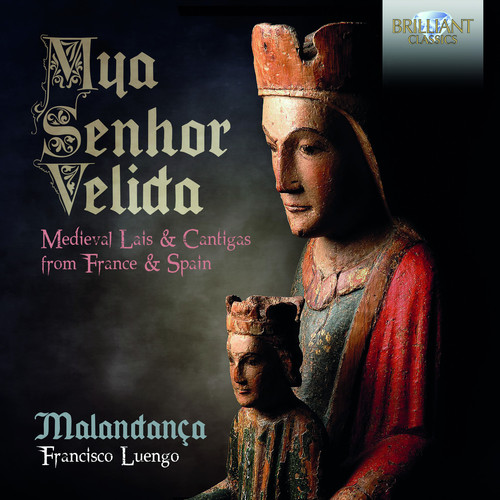Show results for
Deals
- 4K Ultra HD Sale
- 50s Films Sale
- Action Sale
- Alternative Rock Sale
- Anime sale
- Award Winners Sale
- Bear Family Sale
- Blu ray Sale
- Blues on Sale
- British Sale
- Christmas in July
- Classical Music Sale
- Comedy Music Sale
- Comedy Sale
- Country Sale
- Criterion Sale
- Drama Sale
- Electronic Music sale
- Folk Music Sale
- Horror Sci fi Sale
- Kids and Family Sale
- Metal Sale
- Music Video Sale
- Musicals on Sale
- Mystery Sale
- Naxos Label Sale
- Page to Screen Sale
- Paramount Sale
- Rap and Hip Hop Sale
- Reggae Sale
- Rock
- Rock and Pop Sale
- Rock Legends
- Soul Music Sale
- TV Sale
- Vinyl on Sale
- War Films and Westerns on Sale

Mya Senhor Velida
- Format: CD
- Release Date: 6/22/2018

Mya Senhor Velida
- Format: CD
- Release Date: 6/22/2018
- Label: Brilliant Classics
- UPC: 5028421956893
- Item #: 2054123X
- Genre: Classical
- Release Date: 6/22/2018

Product Notes
These medieval cantigas and lais - troubadour compositions from Galicia and France, respectively - display an innovation of the 12th and 13th centuries: themes of courtly love and Marian devotion combined, at once carnal and mystical, encompassing both the profane and the divine. The two lais on this recording are found in a manuscript songbook known as the Noailles Chansonnier from c.1300. In the anonymous Plainte de la Vierge au pied de la croix the Virgin Mary speaks in first person in a figurative lament at the foot of the cross. The Lai de Notre Dame, attributed to 13th-century troubadour Ernoul 'Le Vieux' or 'Le Vielle', begins with the author's promise to keep faith with the Virgin Mary and serve no other woman, a pledge quite reminiscent of those of Alfonso X of Castile in his Cantigas de Santa Maria, one of the largest collections of monophonic songs from the Middle Ages. The Cantigas, attributed to King Alfonso X (1221-1284), were written in early-Medieval Galician-Portuguese, fashionable as a lyrical language in Castile at the time. In Santa Maria loei, e loo e loarei, the king thanks the Virgin Mary for her kindness and protection. Nenbressete, Madre de Deus deals with Mary's role as mediator - in medieval eyes, her primary function. It was composed as a contrafactum on Recordare, translating the antiphon into Galician-Portuguese and expanding it with new musical and poetic concepts. Virgen Madre groriosa, a contrafactum on the estampie 'Reis Glorios' by French troubadour Giraut de Bornelh, binds this album together, demonstrating the relationship between the Galician-Portuguese and French lyrics. To the members of Malandança, medieval music is a field in which both performance and scholarship are unavoidable and interdependent subjects. Research conducted by Francisco Luengo and others into sculptures depicting medieval instruments has opened up a world of sounds, ideas, images and voices from the distant Middle Ages.

